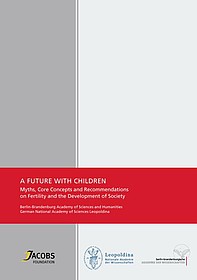National Recommendations
A Future with Children (2012)

Myths, Core Concepts and Recommendations on Fertility and the Development of Society
Berlin-Brandenburg Academy of Sciences and Humanities
German National Academy of Sciences Leopoldina
(2012, 74 pages, ISBN: 978-3-939818-29-8)
The current debates on demographic transformation have been characterised on the one hand by declining birth rates and on the other by increasing life expectancy. Such debates usually focus on the consequences for society, which are frequently described in dark terms. In this booklet, by contrast, you will find analyses and suggestions on how to improve the situation of children and parents to make it easier to realise the desire to have children. In the spring of 2009, both academies set up an interdisciplinary research group sponsored by the Jacobs Foundation that pursued a different perspective. This research group, entitled ‘A Future with Children: Fertility and the Development of Society’, concentrated on the causes of the low birth rates in Germany, Austria, and Switzerland. An important universal element of the group’s research is its focus on the life course. A Future with Children, seen from this perspective, means above all to reconsider the way that the life course is arranged, so that everyone – both women and men – can achieve lasting and equal social participation in the various spheres of life.
The Research Group has determined that two concepts are paramount when it comes to A Future with Children: child and parental well-being. How these concepts are realised in a society can be shown by analysing various individual aspects, including the material situation of parents and children, their healthy development, their participation in education, and their subjective satisfaction. A (family) policy that does justice to developments in society and is also geared towards a future with children should have as its primary goal the well-being of (potential) parents and children. Parents should be put in a position where they
can promote, support, and supervise the development of their children to the very best of their ability. An appropriate family policy above all gives parents family time, financial security, and opportunities to participate in the life of a society, and it guarantees these for children as well. We therefore believe that raising the birth rate, promoting specific family models, and regulating developments in immigration or the labour market are not the primary goals of a family policy that is geared towards a future with children.
Our concentration on the three countries of Germany, Austria, and Switzerland has allowed the Research Group the opportunity to compare and analyse data at the regional level of societies. This ensures the comparability of the fundamental empirical data, as well as the concepts that we draw from them. The Research Group is convinced that this a sensible and forward-looking way to advise on policy, since the effect of measures affecting children and families is highly dependent on context.
We have analysed migration, in particular internal migration, but this topic does not feature prominently in our discussion of how to improve the living conditions of the children in our society. This is because the different opportunities that children have for their futures depend much more on their social background and the regional context in which they live than on their ethnic origins.
From the beginning, the complexity of the topics involved has dictated that we put together an interdisciplinary research group. This access across disciplines represents a new approach and is reflected in the multifaceted nature of our analyses, results, and recommendations.
The detailed results from the Research Group are published in the book Zukunft mit Kindern – Fertilität und gesellschaftliche Entwicklung in Deutschland, Österreich und der Schweiz (A Future with Children: Fertility and the Development of Society in Germany, Austria, and Switzerland; Campus, 2012). The book has been edited by leading experts from the Berlin-Brandenburg Academy of Sciences and Humanities and the German National Academy of Sciences Leopoldina. The book presents the current state of scientific knowledge in a way that has never been achieved before, combining demography, history, medicine, economics, politics, psychology, and sociology.
Downloads

Elmar König
Head of Department Science – Policy – Society, Head of Berlin Office
| Phone | 030 203 8997 - 865 |
| Fax | |
| elmar.koenig (at)leopoldina.org |
